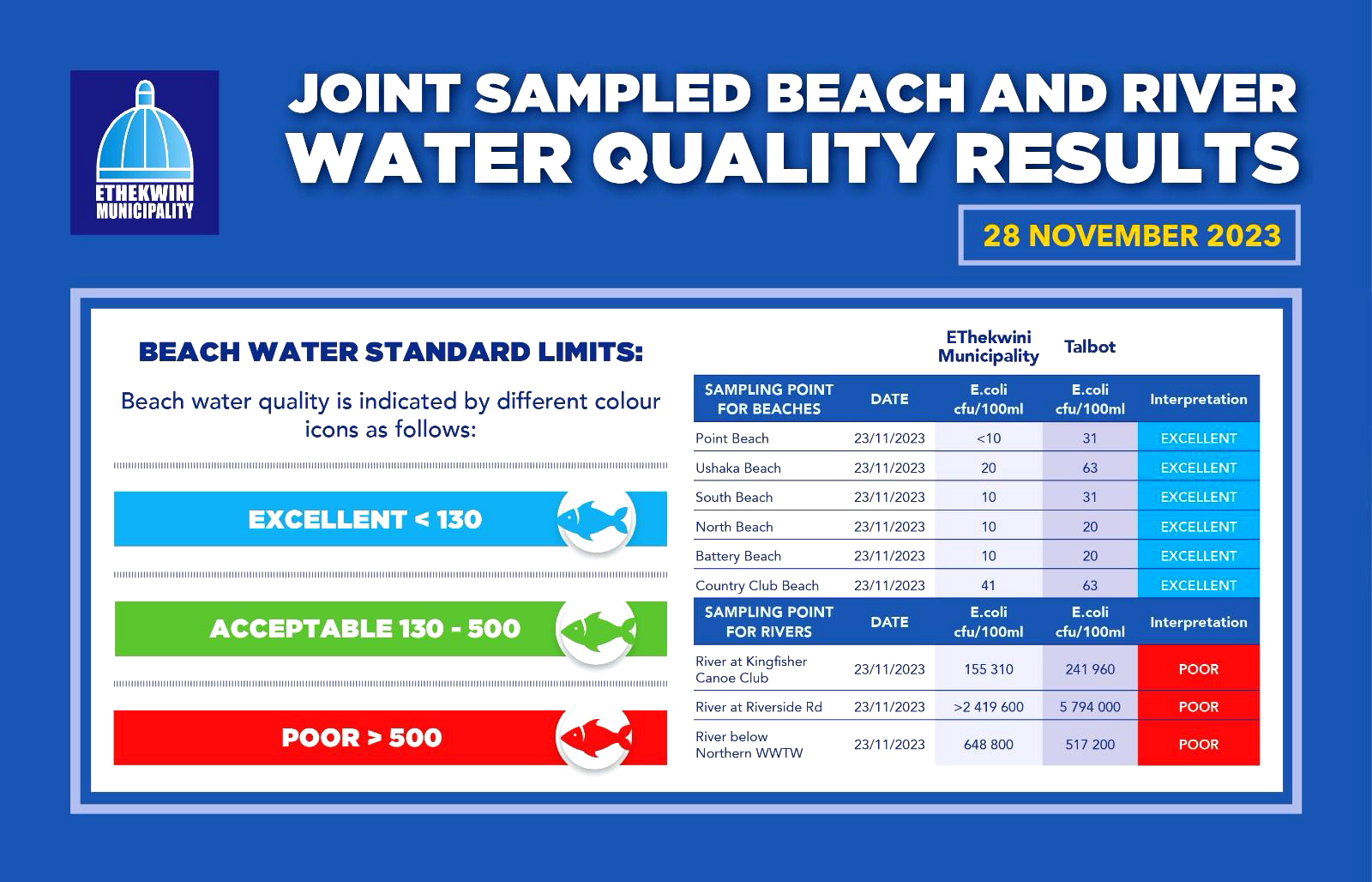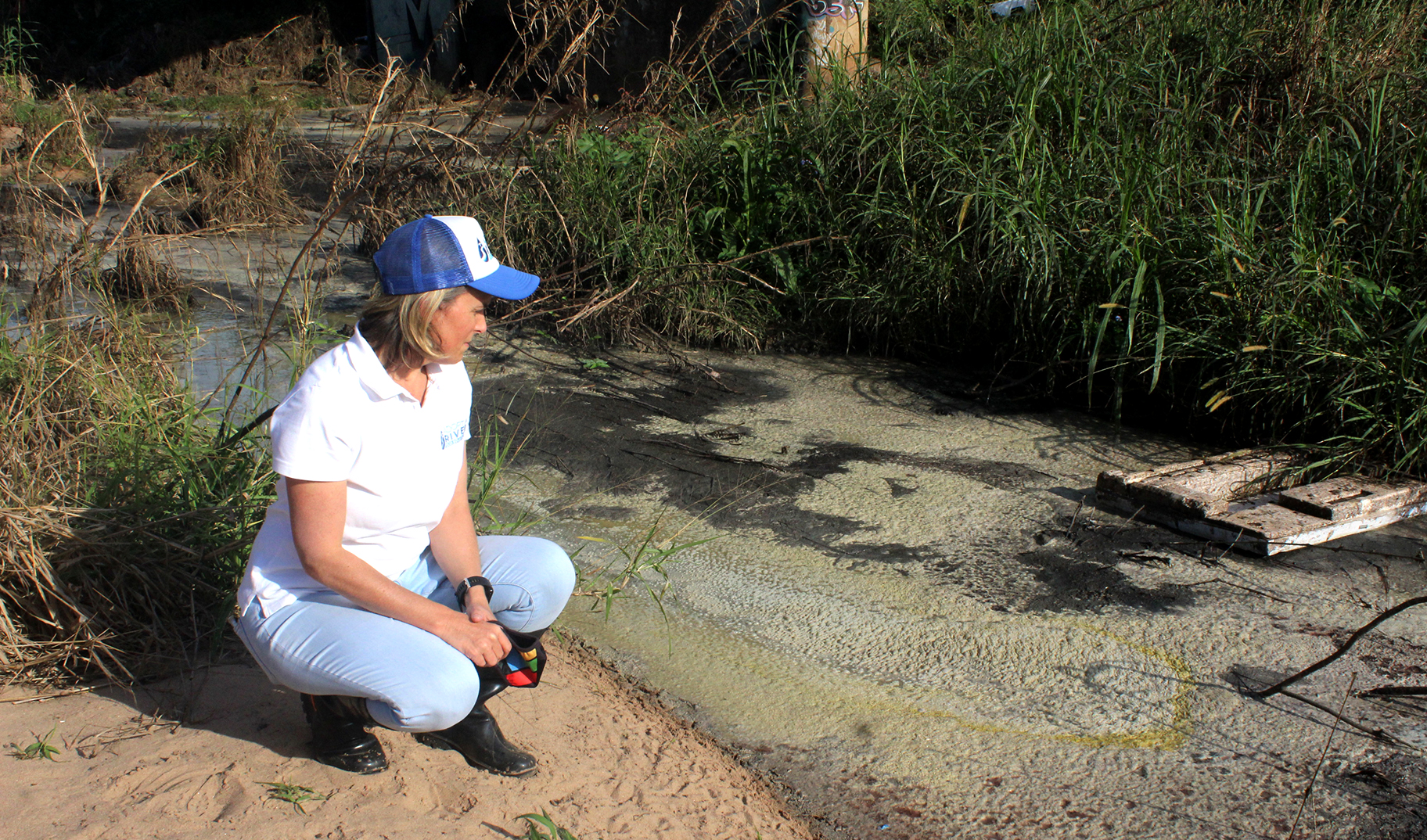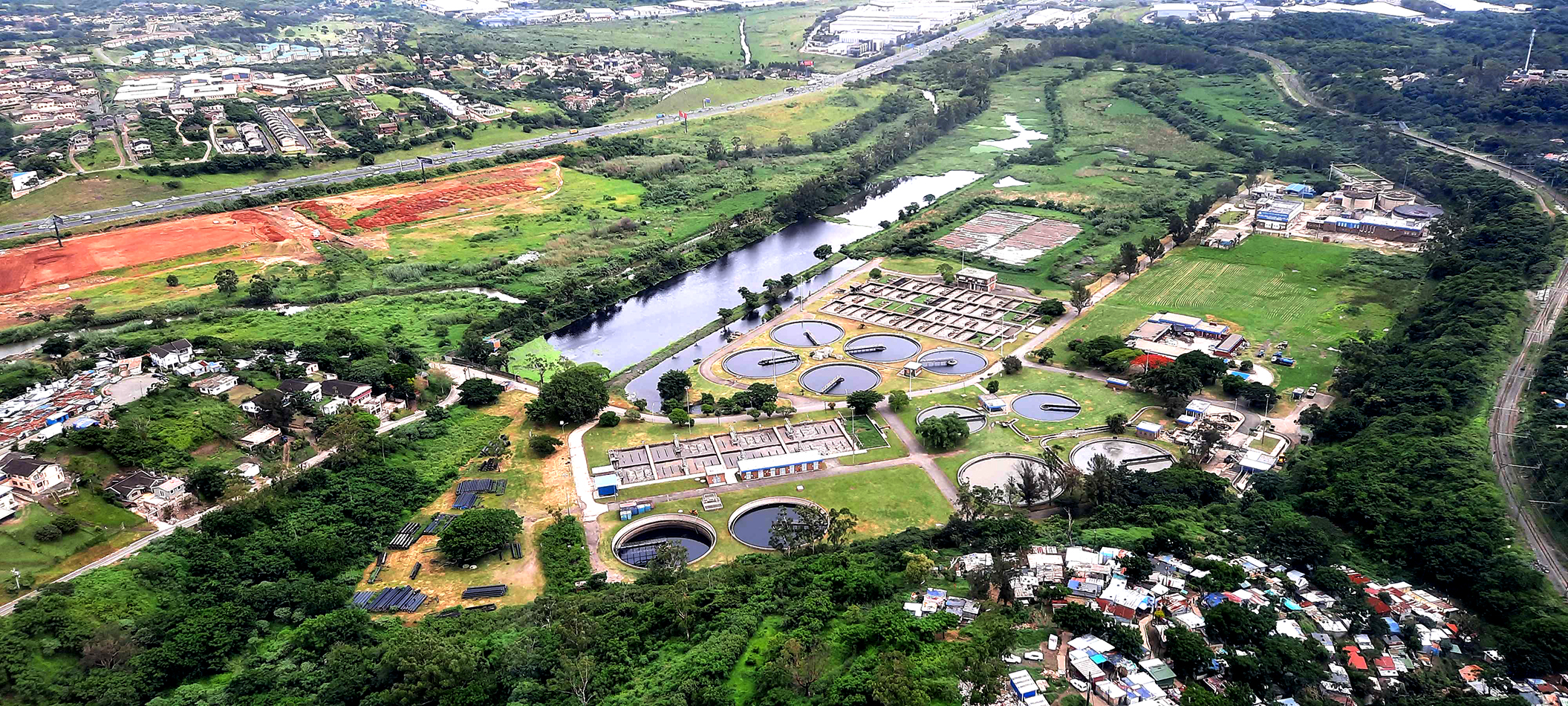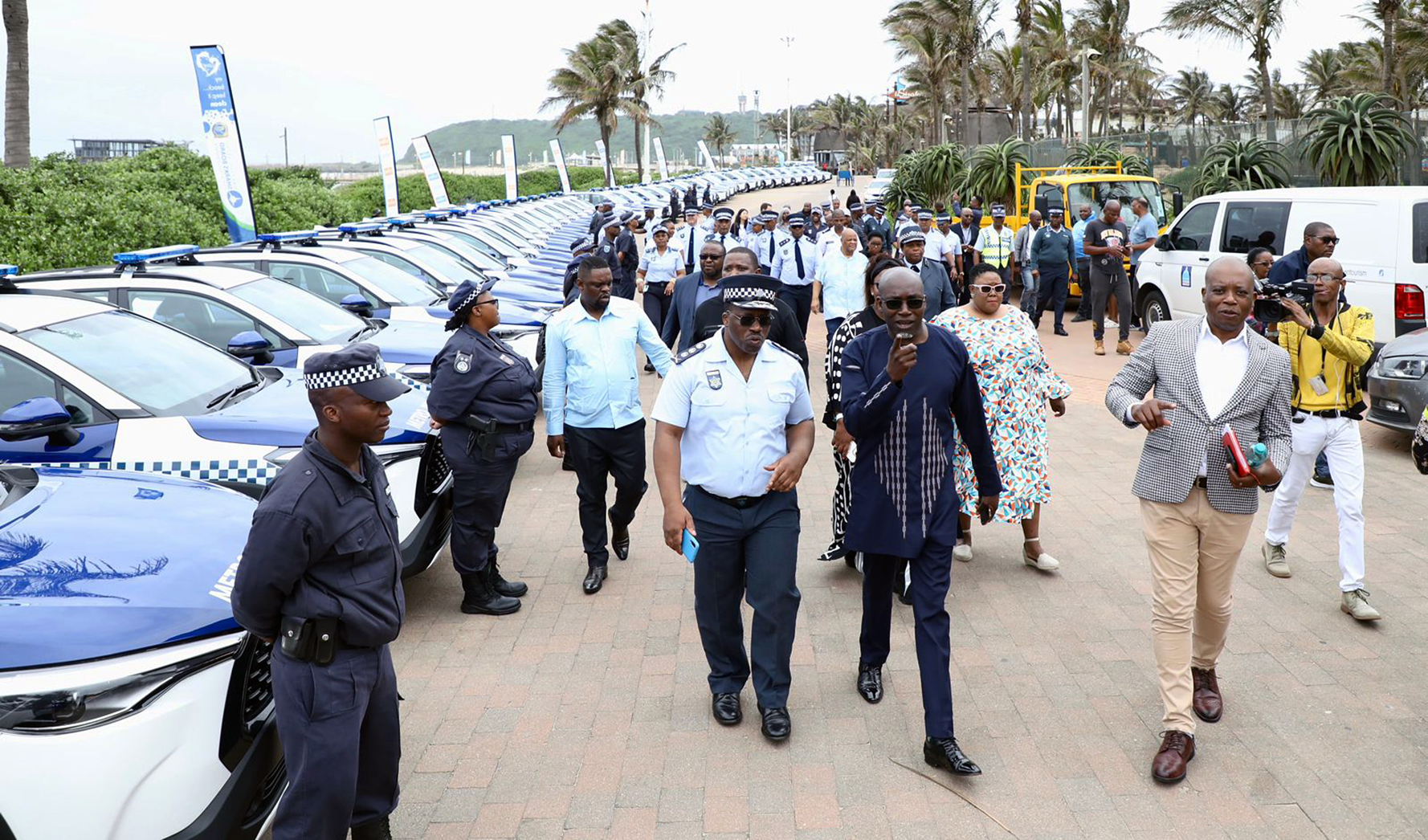The prolonged flow of sewage in rivers leading to the Durban beachfront may start to ease over the next few weeks after the eThekwini Municipality agreed to (partly) hand over control of the city’s largest wastewater treatment plants to a state-owned water utility company.
The initial 12 month-contract provides for the Pietermaritzburg-based uMngeni-uThukela Water Board to assume joint responsibility for the operation and maintenance of the city’s biggest sewage treatment plants — a clear indictment of the city’s failure to remedy the situation on its own.
The exact terms of the contract have not been disclosed, but many Durban treatment plants have been discharging untreated or partially treated effluent into rivers and the Indian Ocean, largely due to infrastructure damage caused by the April 2022 floods, but also because of the prolonged neglect of several treatment plants which predates the flood damage.
The emergency repair plan, announced this week by the water utility’s chairperson, Professor Vusi Khuzwayo, and eThekwini Mayor Mxolisi Kaunda, will involve 10 local wastewater treatment works that collectively process nearly 90% of the city’s sewage and industrial effluent flows.
This includes the Northern Wastewater Treatment Works, which has been discharging poorly treated water into the uMngeni River for more than two years at a point roughly 2.5km upstream of the Blue Lagoon.
Significantly, uMngeni-uThukela will also be responsible for the operation and maintenance of the Southern and Central treatment works (which discharge effluent directly into the sea via offshore pipelines) as well as the uMhlanga, KwaMashu, Phoenix, Amanzimtoti, uMbilo, Isipingo and uMhlatuzana treatment works.
 While the latest water quality tests of seawater along the central Durban beachfront have been rated as ‘excellent’ by both Ethekwini and the independent Talbot laboratory group, the sewage pollution levels in the lower reaches of the Umngeni River remain off the charts – way in excess of the maximum safe recreation level of 500 E.coli units.
While the latest water quality tests of seawater along the central Durban beachfront have been rated as ‘excellent’ by both Ethekwini and the independent Talbot laboratory group, the sewage pollution levels in the lower reaches of the Umngeni River remain off the charts – way in excess of the maximum safe recreation level of 500 E.coli units.
(Image: Supplied)
eThekwini officials promised to curb the flow of sewage into the uMngeni River from the Northern works just before the last Christmas holiday season, but a year later sewage levels in the lower reaches of the Umngeni River remain way above the maximum safe limit of 500 E. coli units — with recent levels still measuring in the millions in the vicinity of the uMngeni Bird Park.
Read more in Daily Maverick: Caught again! Durban tries to hide crappy sea water quality results as holiday season beckons
However, according to a joint statement issued this week by Khuzwayo and Kaunda, the Pietermaritzburg-based regional water utility company formally took over operations of the 10 plants on 15 November.
“We are happy to report that, to date, uMngeni-uThukela Water has completed a conditional assessment of the wastewater infrastructure in the 10 wastewater works and is implementing an urgent programme to restore compliance going into the festive season.
“We have dispatched technical teams from both uMngeni-uThukela Water and eThekwini that have already started working together on identified projects to improve compliance. The delivery of necessary chemicals, integration of monitoring and laboratory analyses is expected to be completed by Friday [1 December].”
The compliance levels from the 10 wastewater works were expected to “start improving by the first week of December”, they said — although an indication of the scale of the problems was evident from Khuzwayo’s statement that the initial 12-month contract would probably have to be extended for up to three years.
 Adopt-a-River founder and pollution monitor Janet Simpkins surveys sewage pollution along the banks of the Umngeni River in August 2022. (Photo: Tony Carnie)
Adopt-a-River founder and pollution monitor Janet Simpkins surveys sewage pollution along the banks of the Umngeni River in August 2022. (Photo: Tony Carnie)
The projects that have been prioritised include the “rehabilitation and putting back into operation of the uMhlanga wastewater works, which last operated before the 2022 floods”.
It would also include the rehabilitation and recommissioning of the Northern works; fixing a major effluent pipeline leading to the uMhlathuzana wastewater works; “reseeding” the Phoenix works and the rehabilitation of the KwaMashu, uMbilo, Isipingo, Amanzimtoti, Central and Southern wastewater works.
However, the full implications of the new arrangement remain unclear.
Janet Simpkins, founder of the Adopt-a-River group that has been monitoring sewage levels along the Durban beachfront and its feeder rivers for two years, said she was “cautiously optimistic — but time will tell.
“I think this agreement is a recognition that the city needs help to resolve this issue, and we will continue to monitor water quality,” she said.
 An aerial view of Durban’s Northern wastewater treatment plant. (Photo: Shawn Herbst)
An aerial view of Durban’s Northern wastewater treatment plant. (Photo: Shawn Herbst)
However, a local water engineering expert was more cautious and declined to comment until the full terms of the agreement were disclosed.
Responding to a question from Daily Maverick on whether the new contract could lead to higher rates or surcharges, uMngeni-uThukela chief financial officer Thami Mkhwanazi indicated that the new contract provided for a “costs plus 4%” arrangement for the utility company, which would be providing the services of additional engineering expertise.
“We do not see a big spike for [Durban] residents,” he said.
Meanwhile, the latest beach water quality tests suggest that the majority of the city’s 23 bathing beaches are currently safe for swimming, although there was a significant hiccup after heavy rains earlier this month — resulting in sewage pollution readings at six central beaches being way above the limits — in some cases more than 30 times higher than regulated recreational standards.
Speaking at a “state of readiness” ceremony on the Durban beachfront on Wednesday, Mayor Kaunda reiterated the city’s commitment to continue its partnership with the Adopt-a-River group and the independent Talbot Laboratories group.
This involves joint testing of seawater quality by the eThekwini Municipality and Talbot laboratory staff.
“We are pleased that the water quality results were comparable and reflected that our water was safe for swimming. The joint sampling is to enable credible comparison of results and to ensure transparency and public safety,” he said. DM
https://www.youtube.com/watch?v=REeWvTRUpMk




 An aerial view of Durban’s Northern wastewater treatment plant. (Photo: Shawn Herbst)
An aerial view of Durban’s Northern wastewater treatment plant. (Photo: Shawn Herbst)